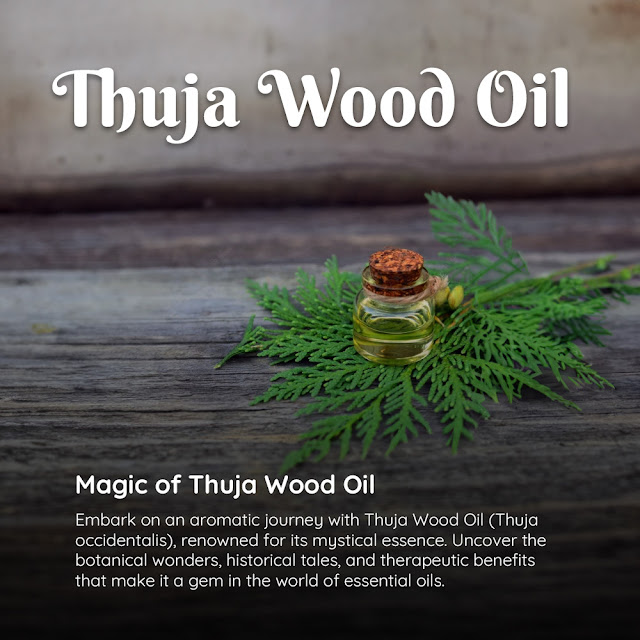Whispers of the Forest: Exploring the Magic of Thuja Wood Oil
Embark on an aromatic journey with Thuja Wood Oil (Thuja occidentalis), renowned for its mystical essence. Uncover the botanical wonders, historical tales, and therapeutic benefits that make it a gem in the world of essential oils.
Introduction:
Step into the enchanting world of Thuja Wood Oil (Thuja occidentalis), a mystical elixir derived from the evergreen Thuja tree. In this aromatic journey, we explore the botanical marvels, historical significance, and therapeutic allure that make Thuja Wood Oil a treasure in the realm of essential oils.
Botanical Information:
Botanical Name: Thuja occidentalis
Common Names: Arborvitae, White Cedar, Eastern Arborvitae
Plant Origin: North America
Plant Part: Wood
Botanical Source: Thuja occidentalis tree
Why It's Famous:
Thuja Wood Oil is celebrated for its grounding and calming properties. Its unique aroma, reminiscent of a forest breeze, makes it a sought-after choice for aromatherapy and spiritual practices.
Aroma Profile:
The aroma of Thuja Wood Oil is earthy, woody, and slightly sweet. Its distinctive scent evokes the serenity of a dense forest, creating a tranquil atmosphere.
Major Components:
The major components of Thuja Wood Oil include thujone, pinene, and camphor. These compounds contribute to its therapeutic properties and aromatic profile.
Historical Shreds of Evidence & Ancient Background Details:
Thuja Wood has a rich history in indigenous cultures, where it was revered for its spiritual significance and used in rituals to connect with nature. Ancient civilizations valued its aromatic essence for both practical and mystical purposes.
Religious Significance:
While Thuja Wood Oil doesn't hold specific religious significance, the Thuja tree has been associated with spiritual symbolism in various cultures, representing protection, longevity, and connection to the divine.
How to Use & How Not to Use:
Thuja Wood Oil can be used in aromatherapy by diffusing its aroma or diluted for topical application. It is not recommended for internal use. A patch test is advisable, especially for individuals with sensitive skin.
Mixing with Other Oils:
Thuja Wood Oil blends well with cedarwood, pine, and frankincense oils. These combinations enhance its grounding properties and create a harmonious aromatic experience.
Pros & Cons:
Pros:
Grounding and calming aroma
Spiritual and therapeutic benefits
Historical significance in indigenous cultures
Cons:
Potential skin sensitivity, especially in concentrated forms
Not recommended for internal use
Hazardous Information:
Thuja Wood Oil should be used with caution, and it is essential to follow recommended dilution guidelines. Pregnant or nursing individuals and children should consult a healthcare professional before using.
Conclusion:
As you delve into the mystical essence of Thuja Wood Oil, let its grounding aroma transport you to the heart of the forest. Embrace the whispers of the trees and the ancient wisdom they carry, making Thuja Wood Oil a captivating addition to your aromatherapy rituals. In the quietude of its woody embrace, discover a connection to nature and a path to holistic well-being.
Keywords:
Thuja Wood Oil, Thuja Occidentalis, Essential Oils, Aromatherapy, Botanical Extracts, Forest Therapy, Mystical Aromas, Historical Remedies, Natural Healing, Holistic Wellness
Hashtags:
#ThujaWoodMagic #EssentialOils #AromatherapyJourney #BotanicalWellness #ForestTherapy #NaturalHealing #HolisticWellness #AncientRemedies #MysticalAromas #ThujaOccidentalis



Comments
Post a Comment